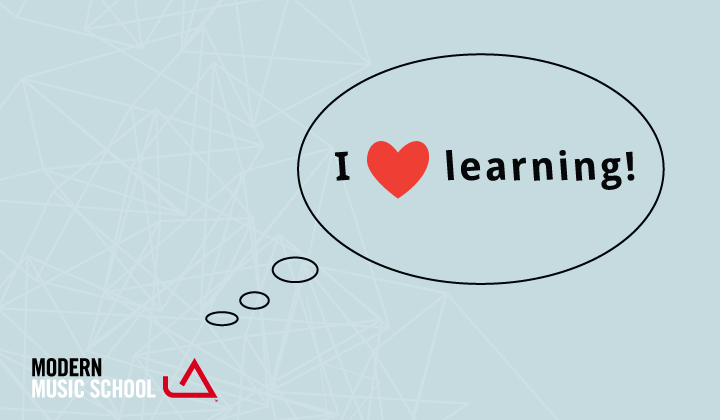6 tips for “frustration-free” learning
Latest Posts • September 25, 2017

A little every day is the key to good, frustration-free learning. I like that: A little every day. That sounds doable, doesn’t it?
I’ve always held a passion for learning, and I want the students at Modern Music School to be passionate learners as well. The “6 tips for frustration-free learning” I’m giving you in this article are aimed at helping you with your music practice. But they’re equally valuable for all forms of learning.
Originally, these ideas come from Barbara Oakley, teacher of the world’s most popular online course “Learning how to learn,” and author of “A Mind For Numbers: How to Excel at Math and Science (Even If You Flunked Algebra).” Don’t let the subtitle fool you, this book is about excelling at all forms of learning and problem-solving. I’ve written about some of the same findings before (here, here and here), but her research definitely puts a new and interesting twist on things and adds some new key ideas!
Here are 6 tips for frustration-free learning and my interpretation of how you can use them in your music practice:
- Chunking:
Learning begins with creating and internalising small, simplified chunks of information.By breaking long strings of information into small chunks, we make them easier to learn and remember. Over time, we can take those small ‘chunks’ of information and add to and connect them with new ones.Let’s look at learning the piano as an example. When we try to learn piano, we have to gradually combine individual notes to play harmony. Each note is equivalent to a chunk. Over time, we then learn to combine these chunks and play entire songs. We can recall the chunks without having to think and are able, after many repetitions, to play a full song automatically and effortlessly.The key is to make sure we get each chunk down before we jump ahead to the next – which basically means repeat, repeat, repeat. A little every day.
- Focused vs. diffuse thinking modes:
To learn and problem-solve we use two modes of thinking.Focused thinking is the kind of thinking where we concentrate intensely. For this kind of thinking we have to set aside a block of time to do nothing but focus on our task.In diffuse thinking, we “switch off” and take a break from whatever we were working on before. We turn our conscious minds off and let the subconscious mind take over. (“Aha” moments happen in this mode when sudden insights or discovery hit us while we’re doing something totally different like sleeping, going for a run or taking a shower.)Make time for focused and diffuse modes in your music practice. Create distraction free stretches of time for highly focused and concentrated practice. Then step away and allow your subconscious mind to take over and connect the dots. In focussed mode, we gather information and form new chunks. In diffuse mode, we combine the different chunks. Notice, both modes of thinking are equally important!
- Pomodoro:
We can set ourselves reasonable quitting times.“Pretty much anyone can focus intently for 25 minutes,” says Oakley, “especially if they know that at the end, a little reward is coming.” She suggests to set a timer for 25 minutes and to turn all distractions off during that time. No cell phones, computers or other electronic devices, just you and your task until the timer runs out.This technique, the Pomodoro Technique, is a time management technique from the 1980s and was originally developed by the Italian Francesco Cirillo. ‘Pomodoro’ is Italian for tomato and Cirillo used a tomato-shaped timer.Use the Pomodoro Technique for your music practice. Set yourself a timer and practice hard. When the timer runs out, reward yourself with a fun break. With this technique, you allow your brain to switch between focused and diffuse thinking. First, you form new chunks; then you let your mind connect the different chunks.
- Procrastination:
The pain is in the anticipation: When we face a big task, the pain centers of the brain light up.Simply thinking about what we don’t want to do makes our brain light up with pain. You think about your music practice and the pain centres in your brain light up? Of course, you’ll try to avoid it. But… This pain goes away as soon as you actually do what you were trying to avoid! Which means doing it is actually less painful than procrastinating on it.Isn’t that crazy? It certainly motivates me. If procrastinating on the task uses up more time and energy than doing the task itself, I’ll just start doing more Pomodoros.Pomodoros can help you establish a good practice routine. Over time, your new routine will form a new habit and replace old procrastination habits.By the way, Oakley calls Procrastination the “single, monumentally important ‘keystone’ bad habit.” Which means it’s a habit that influences many important areas of your life. When you manage to change this one bad habit, “a myriad of other positive changes will gradually begin to unfold.”
- Process vs. Product:
Don’t focus on the outcome (product.) Instead, think about putting in xx minutes and leave it at that.Next time you find yourself procrastinating, ask yourself if you’re focusing on the outcome of your effort rather than just putting in the effort itself. Oakley suggests a focus on the process (the way you spend your time) instead of the product (what you want to accomplish).In your music practice, instead of thinking ‘I have to practice until I memorized the entire song’ tell yourself ‘I’ll just put in 25 minutes of good work.’ Focussing on the product can be overwhelming – we put things off because we think we don’t have enough time or because we simply don’t feel like it. Instead, we should focus on the process, the small chunks of time we put in overtime to memorise the song. Whether or not we achieve this in a single practice becomes secondary.
- Sleep:
Research shows that sleep flushes away neural toxins in the brain.“Only recently have researchers discovered that your brain cells actually shrink when you’re sleeping, which allows fluid to slip past those cells and wash toxins away,” Oakley says. So when you try to operate without enough sleep, “you are literally operating with a poisoned brain.”A good night’s sleep is essential for learning and retaining new information. Sleep promotes diffuse thinking and helps to consolidate what you’ve just learned. So always make enough time for a good night’s sleep. Your learning depends on it!
And now sleep on this ? You’ll absorb what you learned from this article better tomorrow!




Leave A Comment